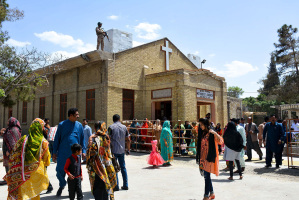European Court Set for Landmark Abortion and Eugenics Cases
The European Court of Human Rights (ECHR) is facing several pivotal cases in the coming months relating to abortion that pro-life advocates hope will help to preserve human life and dignity in Europe, as the court's decisions will be binding to all 47 member states.
The European Center for Law and Justice (ECLJ), which presides as a third party over such decisions, is drawing attention to a number of different cases that will serve to establish abortion policies across Europe, LifeNews.com reported on a statement the ECLJ made. Abortion is widely legal across Europe, with limited restrictions.
One of the most prominent cases concerns a woman who claims she was forced to give birth to a deformed baby after she was denied an abortion. The case was submitted with written observations by the ECLJ to the court on April 2, raising questions of whether eugenics, or the right to abort children who may have a disadvantage in life due to a disability, will become a human right. Anita Kruzmane, the Latvian woman in question, accuses her doctor of not conducting a screening test that would have notified her of her daughter's Down syndrome.
According to the ECLJ, the eugenics court case will be a very significant one, and if Kruzmane's appeal is successful, it may pave the way for the broadening of pro-abortion laws. In its written report, the ECLJ has outlined the stigmatization people with disabilities face in life and highlighted the foundations of human rights as relating to protecting all life, people with disabilities included.
Other more prominent abortion cases concern a Polish mother who is demanding to get permission for her daughter, who is a minor, to have an abortion. Another case concerns doctors who allegedly refused to perform an abortion on a woman who died during pregnancy.
The alleged lack of sufficient information about the risks of abortion will also be discussed, an issue brought up from a case involving a woman who became sterile after having an abortion, a risk which she claims she was not warned about.
"For the ECLJ, it is clear that the Court (which received from the Member States its duty of guaranteeing the fundamental rights of 'all people'), should set limits to those practices, particularly with regard to late abortion (after the viability threshold) and selective abortion based on the characteristics of the child, including genetic characteristics (the sex and health status of the child)," reads the official statement, written by Grégor Puppinck, the ECLJ's director.
Other issues that will also be up for debate by the ECHR in coming months include euthanasia and surrogate mothers, which the ECLJ is also warning might endanger human life.
"The danger is serious, because a 'Court of Human Rights' that would recognize and protect abortion, eugenics, euthanasia and the practice of surrogacy would simply become inhumane," the statement concludes.
A 2005 poll on opinions about abortion in 10 different European countries revealed that most people are in varying degrees of support of the practice. To the question "If a woman doesn't want a children, she should be able to have an abortion," 66 percent of respondents from the Czech Republic said they agree "very much," as did 55 percent and 54 percent of French and Finnish people, respectively.
The results somewhat correlated with a 2005 poll on religious beliefs in Europe – countries that had a more stated belief in God, such as Italy (where 74 percent of respondents said they believe there is a God), were less likely to support abortion, while more secular countries like France and the Czech Republic were more accepting of the practice.




























